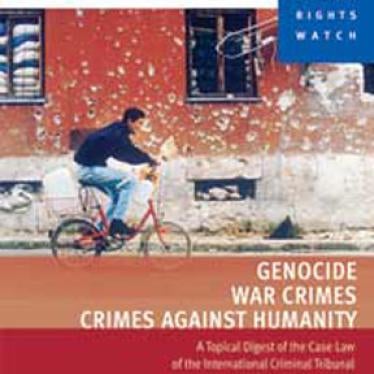The International Criminal Tribunal for the Former Yugoslavia has made precedent-setting decisions on genocide, war crimes and crimes against humanity, Human Rights Watch said today as it released a comprehensive book that organizes the decisions of that tribunal by topic.
“The case law organized in this volume is a legacy that will provide guidance for future generations,” said Jennifer Trahan, of counsel to Human Rights Watch’s International Justice Program. “The tribunal’s work has been immensely important in holding perpetrators of heinous crimes accountable and sending the message that serious crimes will not go unpunished.”
The Yugoslav tribunal has played a critical role in determining responsibility for the horrific crimes that occurred in the Balkan conflicts during the 1990s, Human Rights Watch said. The tribunal suffered a setback with the death of Slobodan Milosevic and the abrupt end of his four-year trial. Just recently, however, the Yugoslav tribunal has begun important trials involving senior officials accused of crimes including genocide committed at Srebrenica, and war crimes and crimes against humanity committed in Kosovo.
The 861-page book from Human Rights Watch organizes the tribunal’s decisions by topic, including war crimes, genocide, crimes against humanity, command responsibility, sentences, fair trial rights and guilty pleas.
“This book makes the important decisions of the tribunal uniquely accessible because it organizes the law by subject in one volume,” said Trahan.
The book applies the law to the facts of selected cases covering atrocities such as the Srebrenica massacre (where approximately 7,000 unarmed men and boys were executed by Bosnian-Serb forces), the siege of Sarajevo, and brutalities perpetrated in camps such as the infamous “Omarska camp” in Bosnia-Herzegovina.
The volume, which is available online and in print (see links below), is oriented to practitioners and staff at institutions established to try such crimes – such as the International Criminal Court and the Sierra Leone Special Court. The book will also serve as a tool for academics, nongovernmental organizations working in the field, and students interested in international criminal justice, Human Rights Watch said.
Human Rights Watch’s original version of the book, which covered both Yugoslav and Rwandan tribunal law, was well-received by officials of international and “hybrid” criminal tribunals.







